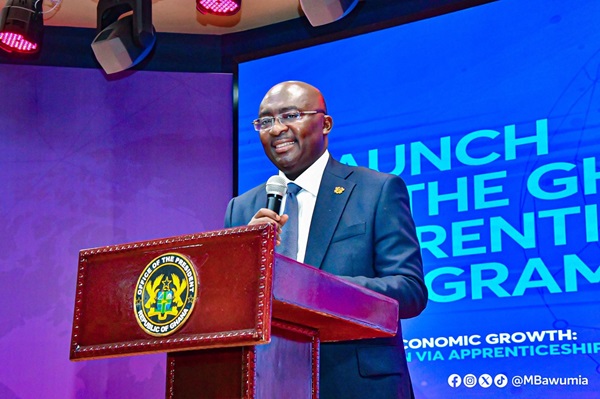Vice President Dr. Mahamudu Bawumia has expressed confidence that the integration of the National Identification Card (GhanaCard) at birth will help to address the existing registration gap.
So far, some 17.7 million adults above the age of 15 have been registered but citizens below 15 years are without the national identification card. The registered number is out of a population of over 30 million people.
However, speaking at the launch of the Ghana Card at Birth system in Accra, Dr. Bawumia said allowing children to obtain GhanaCards at birth will address this gap over time.
The move, he explained, is a collaborative effort between the Ghana Health Service, the Births and Deaths Registry (BDR) and the National Identification Authority (NIA).
Additionally, he noted that it will create the platform to tackle potential problems and risks that the lack of integration between birth records and national identity database pose.
Commenting further, the Vice President said: “This integration ensures that every child born in Ghana is immediately provided with a unique identity, linking them to their mother’s identity and securing their place within our national identity system.
“This monumental integration is not just about issuing a card; it’s about recognising and affirming the rights and existence of our youngest citizens from the moment they enter this world. It’s about laying a foundation for their future, ensuring they have access to health, education and social services without unnecessary barriers.”
As of Monday, 11th March 2024, a total of 17,910,904 enrollment attempts were made for the GhanaCard, with 17,804,405 of these attempts resulting in successful enrollments.
Out of the successful enrollments, 17,750,476 cards have been printed, and 17,075,232 of these have been delivered to the applicants. Additionally, there are 53,929 cards that are ready to be printed, he disclosed.
The new system will allow registration at health facilities across the country, ensuring that no mother is excluded, regardless of her location or socioeconomic status.
“This is especially crucial in rural areas where access to government services can be limited and technology serves as a vital bridge,” the Vice President added.
He asserted that “GhanaCard at Birth is not just an ID; it’s a promise to our children of a future where their identity and rights are recognized from their very first breath. It’s a testament to our commitment to building an effective, efficient, responsive, and accountable public sector that meets the needs of the Ghanaian citizenry”.
An effective and efficient implementation of this system, he noted, offers numerous benefits to mothers and children.
“It provides a systematic and efficient method of registering births, ensuring that every child becomes part of the system from birth. This addresses a long-standing issue in Ghana where many births remain unregistered due to factors such as remote locations and insufficient awareness about the importance of birth registration,” he said.
The system facilitates access to healthcare, education and social welfare programs, safeguarding the rights and entitlements of both mothers andeducation, he stated.
“Ghana has made significant progress in improving healthcare access in recent years, and initiatives like the Ghana Card number at birth further contribute to ensuring that all citizens can avail themselves of essential services,” Dr. Bawumia stated
It is also expected to aid the digitisation of birth registration and identification processes, enhancing the security and integrity of personal data while reducing the risk of identity fraud.
He emphasised that it would also help in the fight against child trafficking, as rescued children can be reunited with their families.
Also speaking at the event, the Director-General of the Ghana Health Service (GHS), Dr. Kumah Aboagye, said the initiative signifies the country’s commitment to using digital tools in improving maternal and child health services.
He said with the launch of the GhanaCard at birth system, the services effectively become available across the country in all facilities accessible and even in the remotest village where e-tracker and light-wave health information management systems are utilised.
The Director-General of NIA, Prof. Ken Attafuah, for his part, said the introduction of the GhanaCard at birth will dispel future contestations about the birth and citizenship of Ghanaians.
According to him, the novelty will ensure that the right data of citizens are properly captured and compiled for future reference.



